- HeatingHeating Services
- Air ConditioningAir Conditioning Services
- Heat PumpHeat Pump Services
- ElectricalElectrical Services
- About
As a homeowner in Colorado, you might be thinking about upgrading to a more efficient and eco-friendly heating system. With the rising popularity of heat pumps, the choice between a dual fuel or an electric heat pump can be a tough decision. This guide will dive into the benefits and distinctions of each type, helping you decide which heat pump system is the perfect fit for your home.
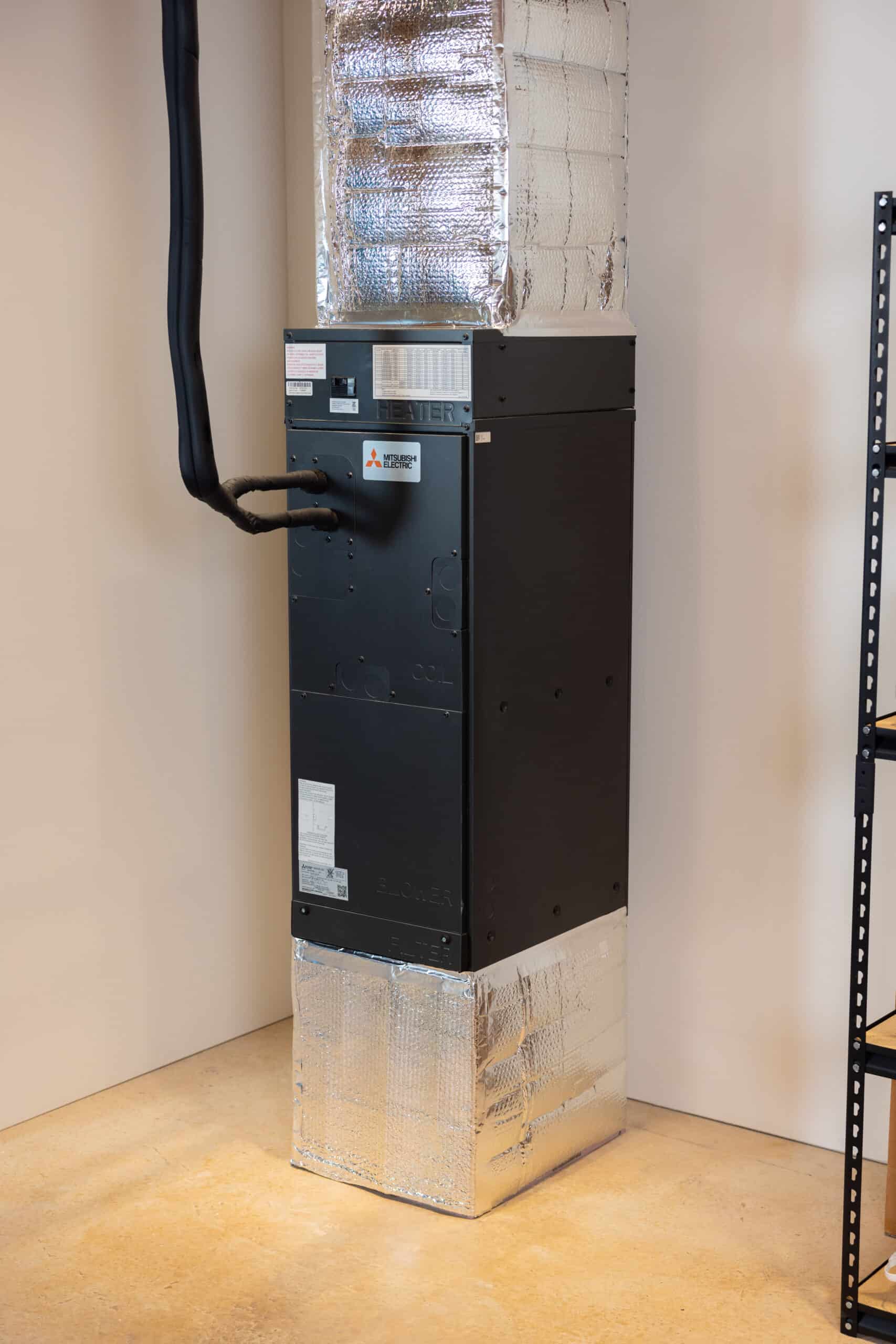
Heat pumps are HVAC units that serve both heating and cooling needs using electricity. Unlike traditional heating systems that generate heat directly, heat pumps transfer heat from one location to another. In the winter, they pull heat from the outside air to warm your home, and in the summer, they function as an air conditioner by extracting heat from your home and releasing it outdoors.
When discussing “dual fuel” or “fully electric” heat pumps, we’re often referring to the backup source or the air handling unit, since all heat pumps fundamentally operate on electricity.
A dual fuel system pairs an electric heat pump with a gas furnace to provide a backup heating source when temperatures drop below the heat pump’s efficient operating range.
On the other hand, a fully electric system uses only the heat pump for both heating and cooling, sometimes supplemented by an electric resistance heater during extreme cold. Both configurations aim to optimize energy use and maintain comfort throughout the year.
A dual fuel heat pump system, also known as a hybrid system, combines an electric heat pump with a gas furnace to maximize heating efficiency and cost-effectiveness. This setup is especially useful if the heat pump isn’t designed for extremely cold climates or if the homeowner prefers using natural gas for operating cost reasons.
The system uses the electric heat pump as the primary heat source during milder weather, taking advantage of its efficiency. When the temperature drops and the heat pump becomes less effective, it automatically switches to the gas furnace. This switch is controlled by a set temperature, in the thermostat, that triggers the furnace to kick in, balancing the use of electricity and gas based on efficiency and heating costs.
This dual fuel heat pump approach provides flexibility, allowing homeowners to choose between energy sources based on their heating needs and cost preferences as the weather changes.
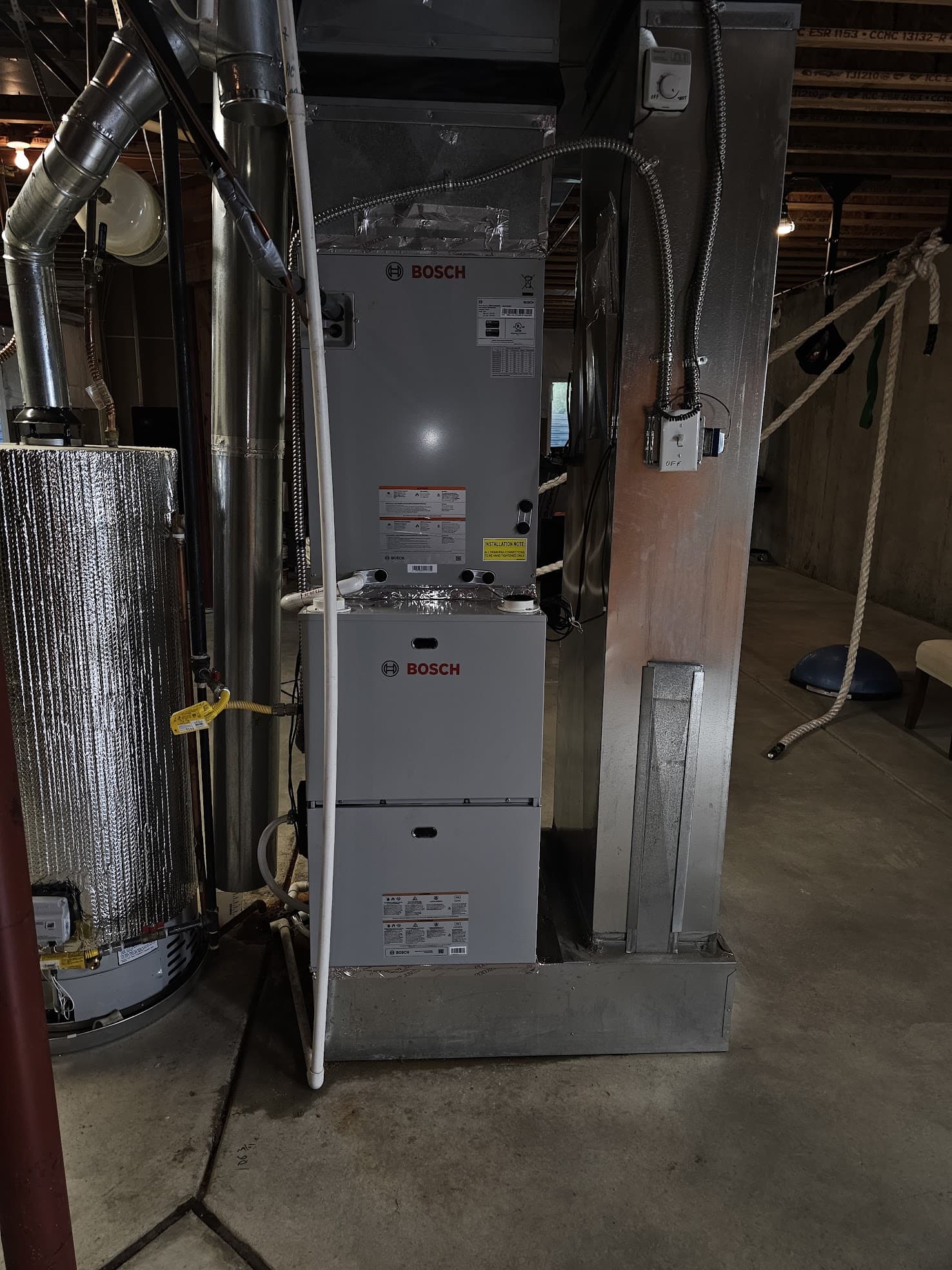
Fully electric heat pump systems are a great option for Colorado homeowners looking to switch to a greener, more efficient heating and cooling option. These systems include high-performing models like the Mitsubishi Hyper-Heat, which use only electricity and can maintain about 80% of their heating capacity even when temperatures drop to -13°F. This capability ensures they remain effective during Colorado’s tough winters.
These heat pumps are particularly beneficial for homes equipped with solar panels, leveraging clean energy to further reduce environmental impact and utility costs. While these systems don’t offer a gas heating option, they come equipped with a supplementary heat strip. This strip isn’t the primary heat source; it’s designed to boost heating during defrost cycles on the coldest days.
At UniColorado Heating & Cooling, we have over ten years of experience installing these systems, which has shown that homeowners do not have to compromise on comfort or functionality. Choosing a fully electric heat pump system aligns with eco-friendly goals and provides reliable and efficient heating and cooling, supporting comfort in colder climates without relying on fossil fuels.
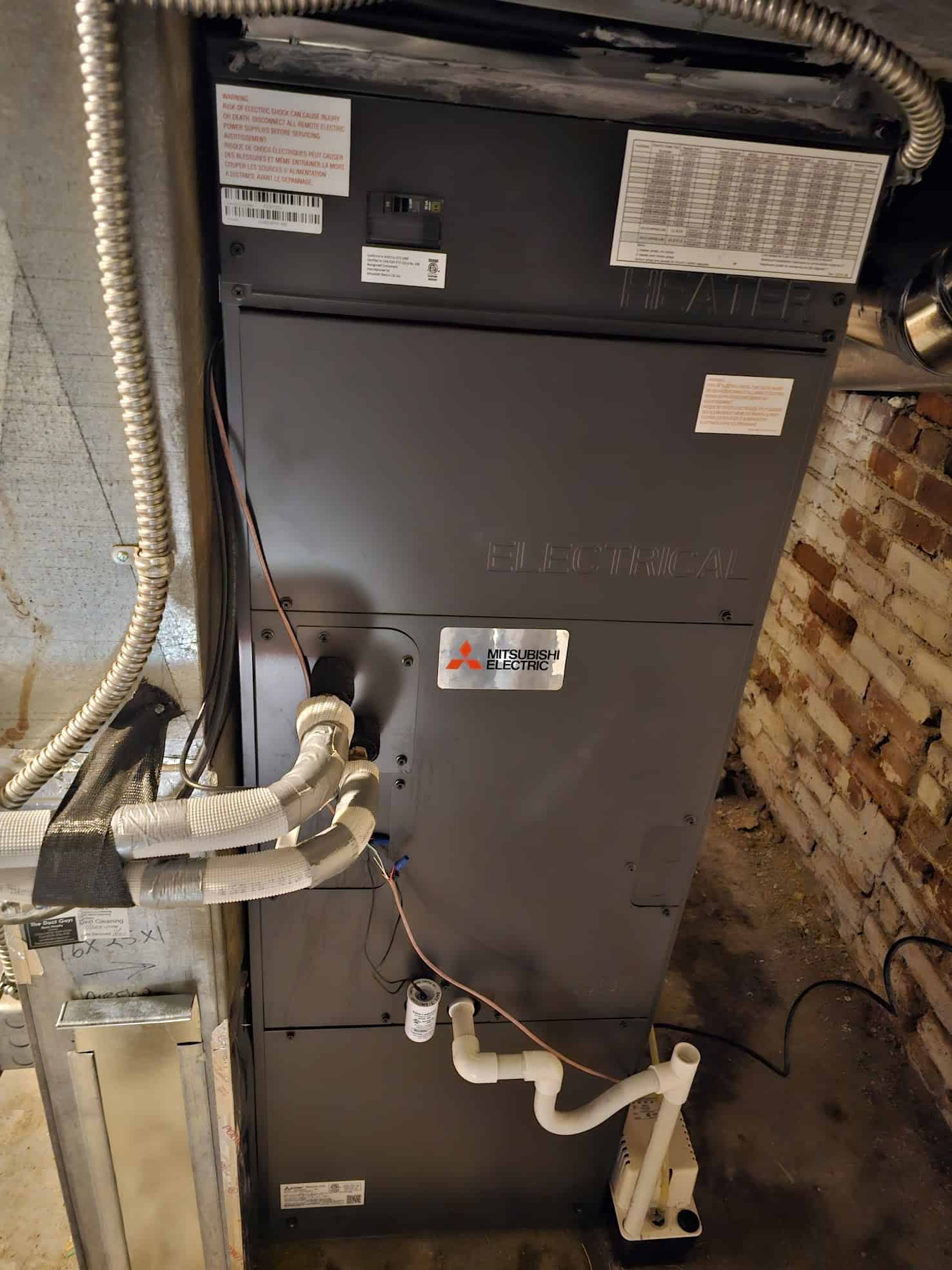
Heat pumps extract heat from the outside air to warm your home. When temperatures drop and frost forms on the outdoor coil, the system’s efficiency can decline. This is why heat pumps have a defrost cycle. The cycle works by reversing the heat pump’s operation to function like an air conditioner. It takes heat from inside your home and moves it outside to melt the frost. This keeps the heat pump working effectively, even in cold weather.
The defrost cycle turns on automatically. It’s controlled by things like the outside temperature, how humid it is, and how long the heat pump has been running. When the defrost cycle is on, you might notice that the air coming from your vents isn’t as warm. That’s because the heat pump is using some of that warm air to defrost the outdoor coil. During this time, backup heating comes in to help keep your indoor temperature steady.
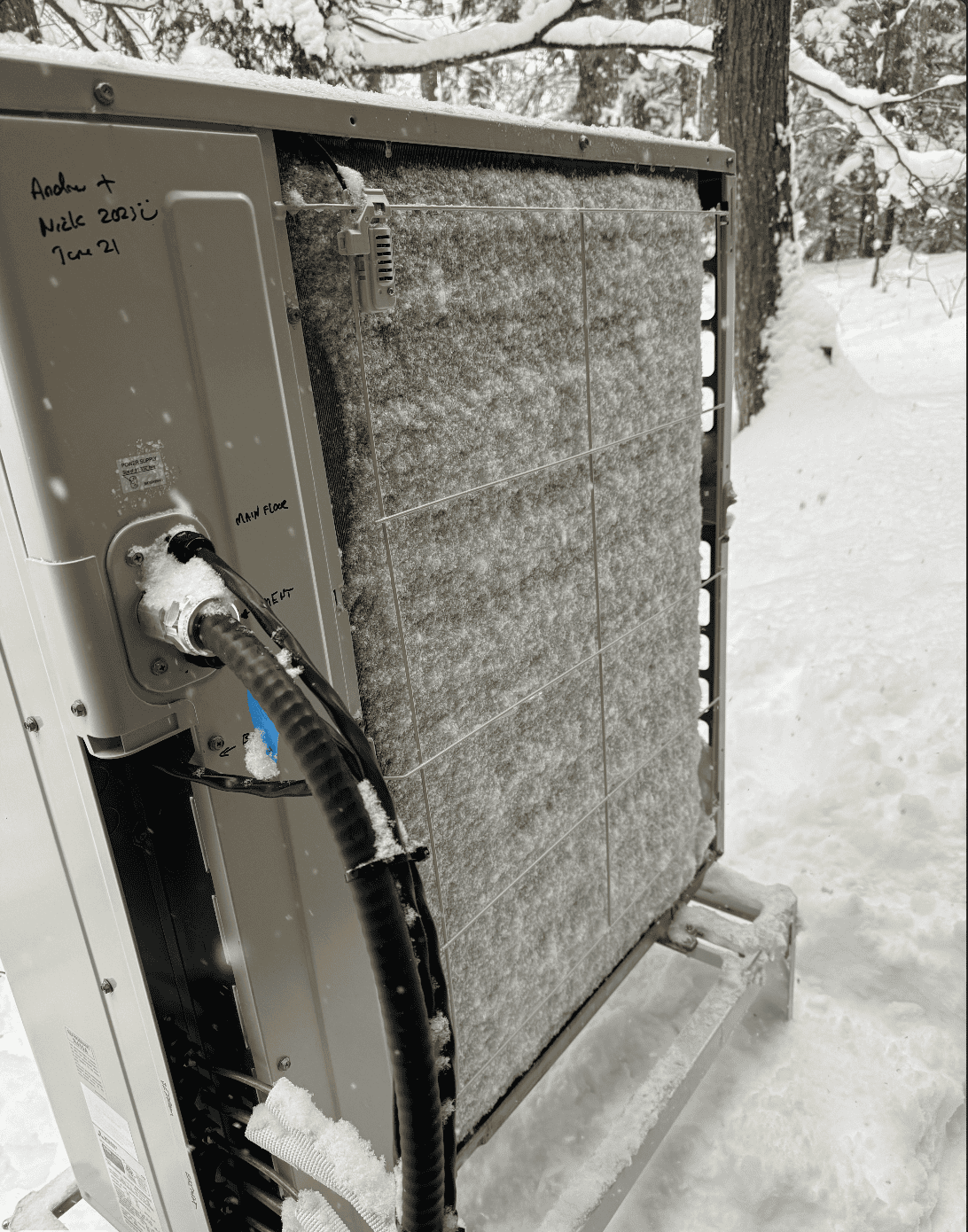
Note on Heating Systems: In dual fuel systems, the backup heating typically involves a furnace. However, the section below focuses on fully electric systems, where such traditional backup is not present. In these setups, the backup heating needs to be considered differently, as outlined below.
When using a cold climate heat pump, it’s a common belief among some homeowners that backup heating is either unnecessary or should only be used as a last resort. This perspective often stems from the misconception that if a heat pump is capable enough, additional heating support isn’t needed. However, even the most efficient heat pumps have operational periods, known as defrost cycles, during which their heating efficiency is temporarily reduced.
During the defrost cycle, the heat pump reverses its function to act like an air conditioner, drawing heat from inside the home to the outside unit to melt accumulated frost. This is essential for maintaining the unit’s efficiency in cold weather but results in a temporary cooling of the indoor air. Here, backup heating plays a critical role. It’s not about replacing the heat pump or functioning as the primary heat source; rather, it’s about providing supplemental warmth during these short intervals to maintain consistent indoor temperatures.
Moreover, relying solely on the heat pump without backup could lead to uncomfortable temperature fluctuations and potentially higher energy costs if the pump operates less efficiently under strain. Backup heating, therefore, isn’t just about having a fallback option but ensuring continuous comfort without overburdening the heat pump. This system is especially important in regions like Colorado, where even a cold climate heat pump might struggle against extreme cold, emphasizing that backup heat is not about lack of confidence in the heat pump’s capabilities, but rather about enhancing overall home comfort and system efficiency.
The term “switchover point” refers to the temperature at which a heating system that uses both a heat pump and a gas furnace switches from one source to the other. This changeover happens to optimize energy use and costs, depending on which heating method is more efficient under current weather conditions. For standard heat pumps, this typically occurs around 30°F. However, heat pumps designed for colder climates can continue to operate efficiently at temperatures as low as -13°F, which is suitable for areas like Colorado where such cold temperatures are rare.
The switchover point can usually be adjusted quite easily on your thermostat, allowing for flexibility based on your specific needs and local energy costs.
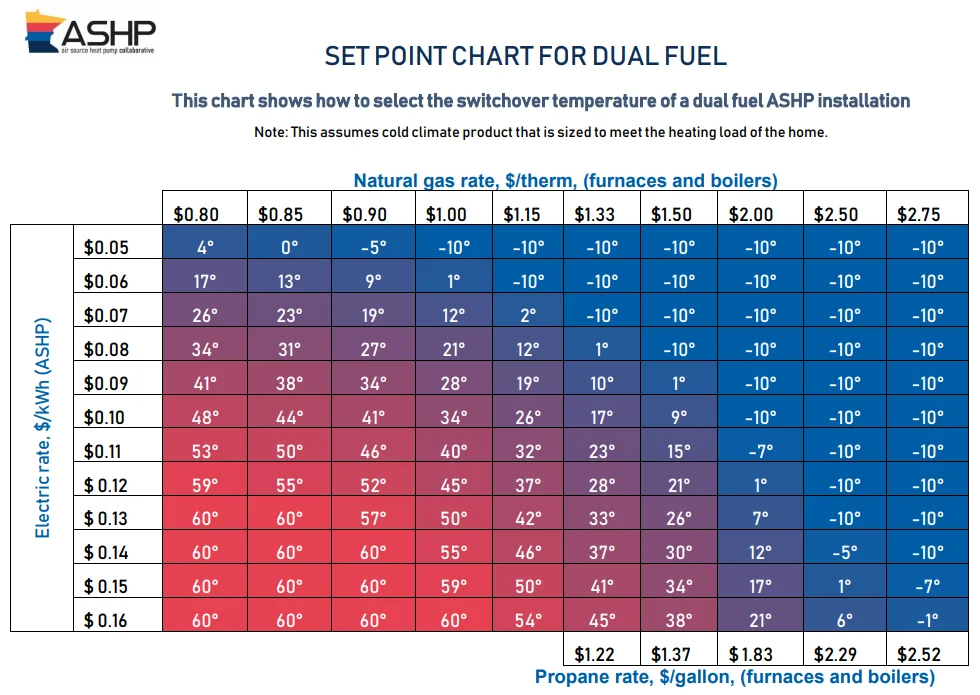
Energy density tells us how much energy is in a certain amount of fuel. For example, one unit of electricity (kilowatt-hour or kWh) has a lot less energy than one unit of natural gas (therm) — about 30 times less. This means that in very cold weather, it’s generally cheaper to heat your home with gas than with electricity. Heat pumps definitely use less total units of energy, but the energy density of electricity is much lower.
We looked at how much it costs to run different heating systems in Colorado homes. Here’s what we found: When it’s cool but not freezing (between 30°F and 60°F), heat pumps are about 15-20% cheaper to use than high-efficiency gas furnaces. But when the temperature drops from 30°F down to 0°F, heat pumps become about 15% more expensive to run. Below 0°F, they’re about 20% more expensive.
Even though heat pumps use less energy overall, the cost of the energy types (electricity vs. gas) can make a big difference in your heating bill. Adding solar panels or battery storage to your home can help you be less dependant on the grid and make your energy use more efficient.
When choosing between a dual fuel or electric heat pump systems, think about these points:
1. Personal preferences: Do you like having the option to switch between gas and electricity, or would you rather go all-electric?
2. Budget: Get a free estimate to see the initial cost to set up each system and the costs you’ll face over time.
3. Environmental goals: If you’re focused on lowering your carbon emissions, you might lean towards a fully electric system.
4. Weather and Climate: In places like Colorado, where winters are very cold, a dual fuel system or a cold climate heat pump can be worthwhile investments.
Rebates and incentives for heat pump installations in Colorado As a Colorado homeowner, you can take advantage of various rebates and incentives when installing a heat pump system. These programs can significantly reduce the upfront cost of your installation, making heat pumps an even more attractive option.
By combining these rebates and incentives, you can significantly lower the upfront investment required for a heat pump installation, whether you choose a dual fuel or fully electric system. UniColorado’s experts can help you navigate the available programs and ensure that you maximize your savings.
As the leading provider of electrified heating and cooling solutions in Denver and the adjacent metro areas, we are uniquely positioned to help you make the most of your heat pump investment. Trust UniColorado Heating & Cooling to deliver unmatched expertise, fair prices, and exceptional service.
Contact us today to schedule a free estimate and discover how we can help you enjoy the benefits of a state-of-the-art heat pump system in your home.
Dual fuel heat pumps can be a worthwhile investment for homeowners who value flexibility in their heating system. They offer the energy efficiency of a heat pump during milder temperatures and the cost-effectiveness of a gas furnace during extremely cold weather.
In extremely low temperatures, heating with gas tends to be cheaper than using an electric heat pump because natural gas is more energy-dense, providing more heat per unit of energy consumed. However, during milder temperatures, heat pumps are often more cost-effective due to their high efficiency.
A dual fuel heat pump integrates an electric heat pump with a gas furnace, allowing it to switch between the two fuel sources based on outdoor temperature and energy costs. In contrast, a standard or fully electric heat pump relies exclusively on electricity for both heating and cooling using an air handler.
The term “split system” can refer to various HVAC configurations, including heat pumps. A heat pump split system consists of an outdoor unit (the heat pump) and an indoor air handler. Generally, heat pumps are more energy-efficient than traditional air conditioners or furnaces because they transfer heat rather than generating it.
The decision between a dual fuel and fully electric heat pump depends on factors such as access to natural gas, upfront costs, operating costs, environmental goals, and performance in cold climates. Dual fuel systems provide flexibility and can be cost-effective in terms of operating costs in areas with very cold winters, while fully electric systems are a good choice for environmentally-conscious homeowners or those without access to natural gas.
Backup for heat pumps is a secondary heating source that supplements the heat pump during extremely cold temperatures or when the heat pump cannot meet the heating demand. This backup can be electric resistance heating (heat strips) or a gas furnace (in dual fuel systems).
In most cases, having a backup heating source for your heat pump is recommended, especially in colder climates. This ensures that your home remains comfortable even during the coldest days or when the heat pump is in defrost mode. While some homeowners may choose not to have backup heat, it is generally advisable to have a redundant heating system for reliable performance.
Installing a heat pump without backup is not recommended in Colorado, as the defrost cycle can cause temperature fluctuations inside your home. During defrost mode, the heat pump may struggle to maintain a consistent indoor temperature, leading to discomfort. Backup heat helps to stabilize the indoor temperature during these cycles.
A dual fuel system combines a gas furnace and a heat pump. In this setup, the heat pump operates as the primary heating and cooling source during milder temperatures, while the gas furnace takes over during colder weather or when the heat pump’s efficiency decreases. This hybrid approach leverages the strengths of both components to provide efficient, cost-effective comfort year-round.
